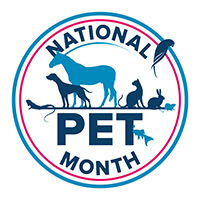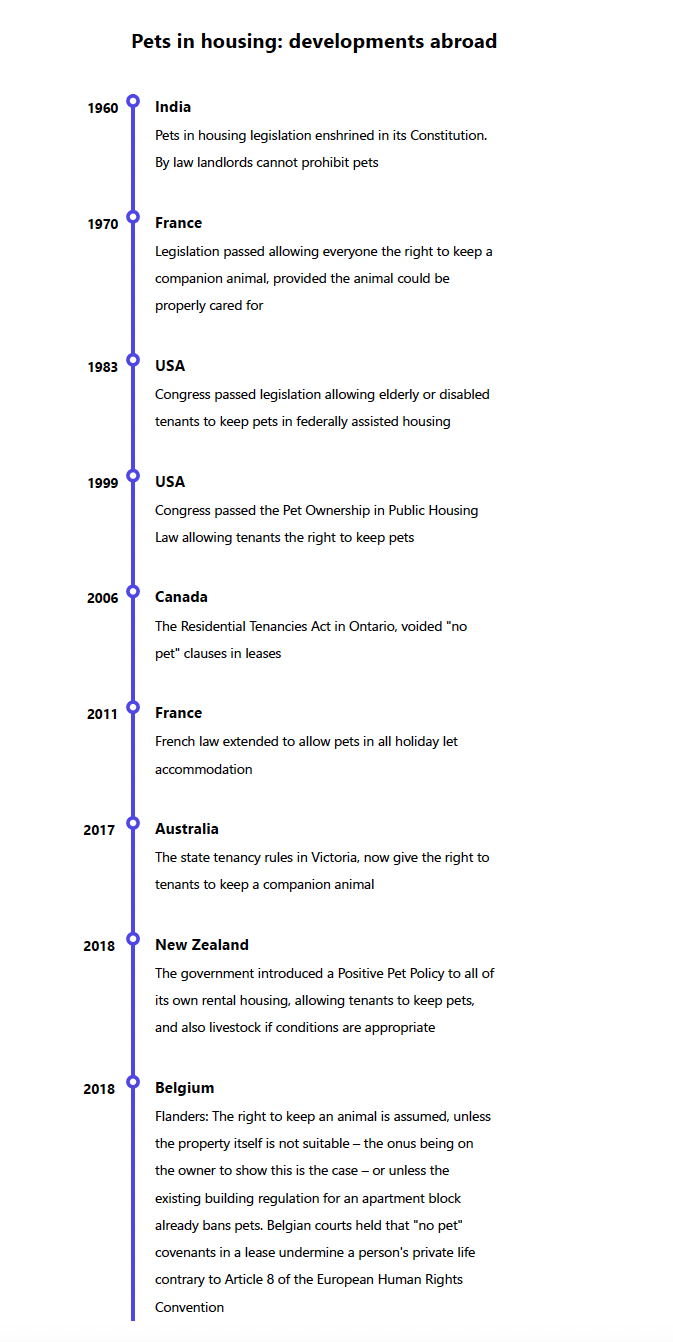April is National Pet Month in the UK and each week SCAS will present a topic related to companion animal welfare, well-being, and the important role they play in the lives of humans. This week Dr Elizabeth Ormerod provides an update on one of SCAS’s priorities, namely Pets in Housing.
The Society for Companion Animal Studies (SCAS) is a multidisciplinary health education charity founded in 1979 with members drawn from the health and social care professions. However, anyone with an interest in the human-animal bond is welcomed as a member. The focus of SCAS is the human-animal bond and how to harness the evidence-based beneficial effects of this bond through pet ownership, assistance animal partnerships and Animal Assisted Interventions. The interdisciplinary nature of SCAS creates unique synergies through which some of modern society’s most pressing problems can be addressed.
One of the most pressing issues affecting people and their companion animals in the UK is the lack of pet friendly housing. SCAS has long recognised the impacts of this and has been advocating for positive pets in housing policies since its inauguration. SCAS pets in housing activities include organising conferences, commissioning research, publications, co-authoring the Pathway guidelines, radio and TV interviews, making presentations to parliamentarians and responding to White Papers, presenting at national and international conferences. We have also met with housing associations and local councils to argue for pet friendly policies and acted as advocates for vulnerable individuals.
To achieve pet friendly housing policies has proven to be the most difficult of all SCAS endeavours. We look to other countries and especially France with great envy – for the French Government in 1970 legislated that landlords could not operate “no pets” rules. This legislation seems to have passed without any great difficulty, and deemed a success as the ruling was later extended to holiday lets. The Indian Constitution enshrined pet ownership in 1960 – landlords in India cannot in law ban pets – however, this is not usually enforced. In 1983 in the USA older and disabled people living in Federally Assisted Housing were given the right to keep companion animals and rights were extended to tenants in public housing in 1999. More recently, in light of the many benefits for individuals and for society accruing from pet keeping, Canada, New Zealand, Australia and Belgium have adopted a more positive approach to a varying extent.
Collaboration
Over the years more organisations concerned with human and animal welfare have become aware of the far-reaching consequences of prohibiting pets. SCAS is collaborating on this issue with an increasing number of organisations and individuals in the UK. Meetings are held in-person and online and it is really heartening to see the real commitment to positive change from such a wide range of players which include politicians, lawyers, estate agents and housing providers as well as animal welfare organisations.
Such commitment is also evident in both Westminster and in the Scottish Parliament where parliamentarians are taking the issue more seriously as they learn the effects of pet bans in housing and how these impact especially upon vulnerable and marginalised groups.
In December 2021 the Scottish Government issued its draft strategy Consultation Paper “A New Deal for Tenants” which stated “We understand that pets are an important part of the family for many and believe private tenants should be able to benefit from the experience of pet ownership, as is the case in other tenures. Studies have consistently shown that owning a pet comes with many benefits for health and wellbeing.”
The SCAS response to this Consultation Paper states:
The experience of the Society for Companion Animal Studies (SCAS) is that legislation is necessary to ensure that people have the right to care for companion animals. We base this on our 40 years experience of advocating for positive approaches to pets in housing and for the introduction of animals as companions for those living long term in institutions. The soft approach through education and encouragement is not working. Without legislation people and pets are subjected to ad hoc rules that are often changed and inconsistently applied. For example, people who had permission to keep a pet, can be threatened with eviction if they do not “get rid of the animal”, following a change in management. Many homeowners are also prevented from having an animal companion due to the existence of “no pet” covenants. This also needs to be addressed as a matter of urgency.
We advise that the Model Tenancy Agreement (MTA) should now be amended to allow landlords the opportunity to seek a larger pet deposit, or to require insurance for pet damage. A YouGov survey commissioned by SCAS in 2021 found the majority of tenants would support this. Landlords have concerns about the possibility of pet damage. Interestingly, research in the USA found that landlords suffered more damage from children and adults than from pets. Recent research conducted by the University of Northumbria, and the Open University has similar findings. Amending the wording of the MTA to state that pets should normally be permitted will not be effective as the MTA is a voluntary code, and we understand that few landlords use this.
Legislation to permit pet keeping in private rentals has been introduced in other countries. Such legislation was enshrined in the Constitution of India in 1960. France introduced national legislation 1970. Since then legislation to allow pet keeping was applied to sheltered housing, and subsequently to public housing in the USA. More recently positive pets in housing legislation was been enacted in Ontario, Canada and Victoria, Australia. The New Zealand Government has introduced pet friendly policies to all of government rented accommodation. In the USA the government, recognising the importance of animal companionship in supporting mental health, designated Emotional Support Animal (ESA) status to the pets of those with mental health problem, relationship with legal protections in that landlords cannot ban ESAs.
Pets are regarded as family members by over 90% of people who have them. There is now irrefutable evidence about the significant role of animal companions in supporting our physical and mental health. This aspect of public health has been subject to serious scientific scrutiny by many disciplines for over 40 years. Animal companionship has been demonstrated to prevent or mitigate a wide range of health conditions. The most significant effects relate to improved cardiovascular health, with pet owners having a 30% reduction in the incidence of heart attack and strokes. Long term survival post serious cardiovascular event is markedly enhanced. The mechanism for this is currently ascribed to the role of oxytocin, a key regulator of the cardiovascular system, elevated when we interact with pets. Companion animals mitigate against loneliness and depression, a role very evident throughout the pandemic. Children raised with pets are found to suffer from fewer allergies of any kind. They also suffer from fewer infections, have better school attendance, higher academic achievement, and higher levels of empathy. There is evidence that youth who are bonded to dogs find the transition to adulthood easier and are less likely to get involved in drugs, gangs and crime.
The most vulnerable citizens can benefit enormously from the opportunity to care for an animal. Yet they are often denied access to the plethora of documented benefits that can accrue from the human-animal bond. The failure to accommodate pets in housing is a moral issue for society, not least because of the detrimental impacts that enforced pet loss harm the wellbeing of both human and animal populations.
In addition to legislation to ensure tenants can have pets there should be stronger guidance on issues such as pet selection, for example how to avoid buying from puppy farms and dealers; and about selecting the right pet for you. Encouragement should be given to dog trainers through provision of access to public halls and open spaces for training. SCAS
In June 2022 the paper, “A Fairer Private Rented Sector” was presented to the Westminster Parliament by the Secretary of State for Levelling Up, Housing and Communities and Minister for Intergovernmental Relations, The Rt Hon Michael Gove MP. This is another very welcome development. The section pertaining to pets includes the statement:
“We will legislate to ensure landlords do not unreasonably withhold consent when a tenant requests to have a pet in their home, with the tenant able to challenge a decision. Alongside this, we will make it easier for landlords to accept pets by amending the Tenant Fees Act 2019 to include pet insurance as a permitted payment. This means landlords will be able to require pet insurance, so that any damage to their property is covered. We will continue to work with landlords and other groups to encourage a common-sense approach. Pets can bring a huge amount of joy and we are committed to supporting responsible pet ownership in the PRS. Alongside greater security and quality, these measures will help tenants truly feel like their house is their home.”
International Pets in Housing Steering Group
There is a lack of pet friendly housing in many countries – this is a problem of global concern. Yet, as previously stated, some governments have implemented positive steps and there is much we can learn from their experience. SCAS therefore initiated an International Pets in Housing Steering Group through which to address the issues on a global scale. With the support of Holly Dalby, an MSc student from Stirling University, we are currently identifying knowledge gaps in pets in housing research and practice. A global survey will follow. An outcome will include a White Paper highlighting best practice and the creation of a new body to advise on such issues.
SCAS Pets in Housing Workshop, ISAZ, Edinburgh, Sunday morning 18th June
SCAS is delighted to be hosting a Pets in Housing Workshop in association with the forthcoming ISAZ conference in Edinburgh. Our workshop objectives include raising awareness of the nature, scale and complexity of this issue which can have tragic consequences for the owner and companion animal. We will collect feedback from international delegates on what research has been conducted, and what is still required. Delegates will be empowered to become a tenant advocate, to share knowledge of the health and economic benefits to landlords of pet keeping tenants. Delegates will be enabled to create pets in housing guidelines for their communities.
It is most important that we continue to share information and keep up the pressure about this important topic. We hope to see you there if this is a subject of interest to you.
Evidence-based research shows that the introduction of pet friendly policies would improve human health and well-being, reduce crime, improve animal welfare and result in significant fiscal savings.
For more information email Dr Elizabeth Ormerod elizabeth.ormerod@btinternet.com
Further reading and information
New Model Tenancy Agreement Model agreement for a shorthold assured tenancy – GOV.UK (www.gov.uk)
A New Deal for Tenants new-deal-tenants-draft-strategy-consultation-paper.pdf (www.gov.scot)
A Fairer Private Rented Sector A Fairer Private Rented Sector (publishing.service.gov.uk)
SCAS Pets in Housing www.scas.org.uk
ISAZ Conference Home | ISAZ 2023


